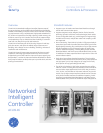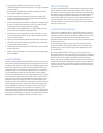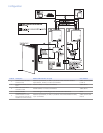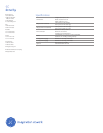Supports RIMs and RRMs for a maximum of 172 fully
configurable supervised six-state inputs or 156 fully configurable
Form-C outputs.
Provides local and global alarm masking capabilities initiated
from readers, keypads or operators.
Full UPS battery backup included for controller, readers, REX
devices, modems and door locks standard. Optional batteries
required, see ordering information.
Power Fault Detection: Internal for the detection and reporting to
the server of power fault conditions: loss of AC power and bat-
tery voltage low when utilizing the UPS capability.
Configurable local and global alarm-to-relay linking and local
annunciation with conditional relay activation.
Multi-drop up to 16 ACU panels per server serial port, or up to
15 ACU panels down-line from an ACU panel connected to the
server via LAN or dial-up.
Optional on-board DES encrypted communication to the server.
On-board LAN communication using TCP/IP giving a download
of up to 3,000 cards per second.
Dual RS-485 communication port for redundant communication
paths to the server.
Optional high integrity dial-up communication using high speed
dial-up modems.
Local Database
The ACU’s local database is downloaded from the server to provide
local access control processing even in the unlikely event that com-
munication with the server is lost. The local database supports stor-
age of up to 250,000 card records, including associated PIN, time
schedule and door authorization parameters. When a cardholder
presents a card to a reader, the ACU retrieves the card record from
its local database to determine if the individual is authorized for
entry at the associated door, and during that day and time. The ACU
then activates the appropriate lock control relay if access is autho-
rized. When the transaction is complete the access event is trans-
mitted to the server for storage on disk. If communication is lost
between the ACU unit and the server, the event is stored locally until
communication is restored — after which all locally stored events
will be uploaded to the server for storage on disk. A minimum of
10,000 event transactions can be stored in local memory. The
actual number of transaction events that may be stored is dynami-
cally allocated within the 16 MB of available memory, depending on
the number of cardholders in the panel. The method of storing and
uploading events also applies to alarms and other events.
•
•
•
•
•
•
•
•
•
•
Alarm Monitoring
All ACUs are provided with 12 supervised alarm inputs plus cabinet
tamper detection, power fault and low battery alarms. The ACUs
also contain 12 auxiliary output relays which can be locally or glob-
ally linked to single or multiple alarm inputs with conditional activa-
tion. Relay linking and activation parameters, as well as reader,
remote control and time commands, are also downloaded from the
server and stored in local memory, thus allowing local time com-
mand processing to continue in the unlikely event that communica-
tion to the server is lost.
Communication Options
The ACUXL16 is equipped with an onboard LAN port for communi-
cation over a standard 10 Base-T network using TCP/UDP protocol.
Network connection results in fast download speeds of up to 3,000
card records per second. Up to 15 ACU panels may be multi-
dropped (via RS485) down-line from an ACU panel connected to the
server through a LAN.
The ACUXL16 also supports direct multi-drop connection to the
server via RS485 for environments where a LAN connection is not
available. Up to 16 ACU panels may be multi-dropped from each
server serial port.
ACUs are available with full dial-up control for connection over
standard telephone lines to any GE Security Diamond II or Sapphire
Pro system. Up to 15 ACU panels may be multi-dropped (via RS485)
down-line from an ACU panel connected to the server through
dial-up. The dial-up software is designed to allow the ACU to dial-up
to eight pre-programmed telephone numbers through an optional
modem to annunciate alarms and/or upload transaction history to
a server. Optional modems are also added to the server when dial-
up panels are used.






